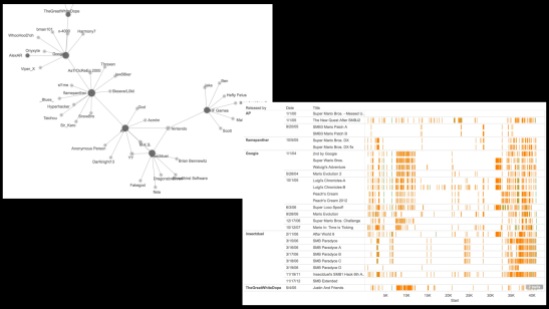
On January 7, 2016, I’ll be participating in a panel, organized by Mark Sample, on “Weird DH” at the MLA Convention in Austin. Here’s the lineup:
107. Weird DH
Thursday, 7 January, 3:30–4:45 p.m., Lone Star C, JW Marriott
Program arranged by the forum TC Digital Humanities
Presiding: Mark Sample, Davidson Coll.
1. “Speculative Data: Postempirical Approaches to the ‘Datafication’ of Affect and Activity,” Shane Denson, Duke Univ.
2. “Analyzing Belligerent Erasure: Weird Digital Humanities and/in the Native,” Jeremy Justus, Univ. of Pittsburgh, Johnstown
3. “‘Weird Tales of Super-K’: A Synesthetic Journey into the National Security Archive’s Kissinger Correspondence,” Micki Kaufman, MLA
4. “Danger, Jane Roe! Using Embroidery and Electronics to Make Data Weird,” Kim Knight, Univ. of Texas, Dallas
Subject:
Keywords:
And here’s the abstract for my talk:
Speculative Data: Post-Empirical Approaches to the “Datafication” of Affect and Activity
Shane Denson, Duke University
A common critique of the digital humanities questions the relevance of quantitative, data-based methods for the study of literature and culture; in its most extreme form, this type of criticism insinuates a complicity between DH and the neoliberal techno-culture that turns all human activity, if not all of life itself, into “big data” to be mined for profit. Drawing on recent reconceptions of DH as “deformed humanities” – as an aesthetically and politically invested field of “deformance”-based practice – this presentation describes several methods by which a decidedly “weird” DH can avail itself of data collection to interrogate and critique “datafication” itself.
The focus is on work conducted in the context of Duke University’s S-1 Speculative Sensation Lab, where literary scholars, media theorists, artists, and “makers” of all sorts collaborate to produce computational and data-driven “things to think with” that blur the boundaries between art and digital scholarship. One such project, Manifest Data, uses a piece of “benevolent spyware” that collects and parses data about personal Internet usage in such a way as to produce 3D-printable sculptural objects, thus giving form to data and reclaiming its personal value from corporate cooptation. Another ongoing project uses data collected by (scientifically questionable) biofeedback devices to perform realtime collective transformations of audiovisual materials, opening theoretical notions of “post-cinematic affect” to robustly material, media-archaeological, and aesthetic investigations. These and other projects, I contend, point the way towards a truly “weird DH” that is reflexive enough to suspect its own data-driven methods but not paralyzed into inactivity.
Bibliography:
S-1 Speculative Sensation Lab. Manifest Data. Collaborative art/theory project. Description online: <http://s-1lab.org/project/manifest-data/>.
S-1 Speculative Sensation Lab (with contributions from Luke Caldwell, Karin Denson, Shane Denson, Amanda Starling Gould, David Rambo, Libi Striegl, and Max Symuleski). “Manifest Data: A Kit to Create Personal Digital Data-Based Sculptures.” Hyperrhiz: New Media Cultures 13 (2015): <http://hyperrhiz.io/hyperrhiz13/sensors-data-bodies/manifest-data.html>. Web.
Sample, Mark. “Notes Towards a Deformed Humanities.” Samplereality (2 May 2012): <http://www.samplereality.com/2012/05/02/notes-towards-a-deformed-humanities/>. Web.
Samuels, Lisa, and Jerome McGann. “Deformance and Interpretation.” New Literary History 30.1 (1999): 25–56. Print.
Shaviro, Steven. Post-Cinematic Affect. Winchester: Zero Books, 2010. Print.







